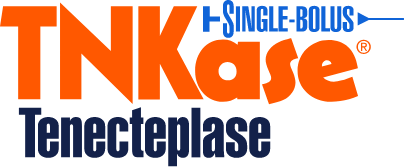Important Safety Information
Contraindications
TNKase is contraindicated in any patients with:
- Active internal bleeding
- Intracranial or intraspinal surgery or trauma within 2 months
- Known bleeding diathesis
- Current severe uncontrolled hypertension
- Presence of intracranial conditions that may increase the risk of bleeding (eg, intracranial neoplasm, arteriovenous malformation, or aneurysm)
TNKase is also contraindicated in patients for the treatment of STEMI with:
- History of intracranial hemorrhage
- History of ischemic stroke within 3 months
Warnings and Precautions
Bleeding
TNKase can cause significant, sometimes fatal, internal or external bleeding, especially at arterial and venous puncture sites. Concomitant use of other drugs that impair hemostasis increases the risk of bleeding. Avoid intramuscular injections and trauma to the patient while on TNKase. Perform arterial and venous punctures carefully and only as required. To minimize bleeding from noncompressible sites, avoid internal jugular and subclavian venous punctures. If an arterial puncture is necessary during TNKase administration, use an upper extremity vessel that is accessible to manual compression, apply pressure for at least 30 minutes, and monitor the puncture site closely. Should serious bleeding that is not controlled by local pressure occur, discontinue any concomitant heparin or antiplatelet agents immediately and treat appropriately.
Aspirin and heparin have been administered concomitantly with and following administration of TNKase in the management of acute myocardial infarction. Because heparin, aspirin, or TNKase may cause bleeding complications, carefully monitor for bleeding, especially at arterial puncture sites. Hemorrhage can occur 1 or more days after administration of TNKase, while patients are still receiving anticoagulant therapy.
In the following conditions, the risks of bleeding with TNKase therapy for all approved indications are increased and should be weighed against the anticipated benefits: recent major surgery or procedure, (eg, coronary artery bypass graft, obstetrical delivery, organ biopsy, previous puncture of noncompressible vessels); cerebrovascular disease; recent intracranial hemorrhage (if not contraindicated); recent gastrointestinal or genitourinary bleeding; recent trauma; hypertension: systolic BP above 175 mm Hg or diastolic BP above 110 mm Hg; acute pericarditis; subacute bacterial endocarditis; hemostatic defects including those secondary to severe hepatic or renal disease; significant hepatic dysfunction; pregnancy; diabetic hemorrhagic retinopathy or other hemorrhagic ophthalmic conditions; septic thrombophlebitis or occluded AV cannula at seriously infected site; advanced age; and patients currently receiving anticoagulants; or any other condition in which bleeding constitutes a significant hazard or would be particularly difficult to manage because of its location.
Hypersensitivity
Hypersensitivity, including urticarial/anaphylactic reactions, have been reported after administration of TNKase (eg, anaphylaxis, angioedema, laryngeal edema, rash, and urticaria). Monitor patients treated with TNKase during and for several hours after administration. If symptoms of hypersensitivity occur, initiate appropriate therapy (eg, antihistamines, corticosteroids, or epinephrine).
Thromboembolism
The use of thrombolytics can increase the risk of thrombo-embolic events in patients with high likelihood of left heart thrombus, such as patients with mitral stenosis or atrial fibrillation.
Cholesterol Embolization
Cholesterol embolism has been reported in patients treated with thrombolytic agents. Investigate cause of any new embolic event and treat appropriately.
Arrhythmias
Coronary thrombolysis may result in arrhythmias associated with reperfusion. It is recommended that anti-arrhythmic therapy for bradycardia and/or ventricular irritability be available when TNKase is administered.
Increased Risk of Heart Failure and Recurrent Ischemia When Used With Planned Percutaneous Coronary Intervention (PCI) in STEMI
In a trial of patients with STEMI, there were worse outcomes in the individual components of the primary endpoint between TNKase plus PCI versus PCI alone (mortality 6.7% vs 4.9%, respectively; cardiogenic shock 6.3% vs 4.8%, respectively; and CHF 12% vs 9.2%, respectively). In addition, there were trends towards worse outcomes in recurrent MI (6.1% vs 3.7%, respectively; p=0.03) and repeat target vessel revascularization (6.6% vs 3.4%, respectively; p=0.0045). In patients with large ST segment elevation myocardial infarction, physicians should choose either thrombolysis or PCI as the primary treatment strategy for reperfusion. Rescue PCI or subsequent elective PCI may be performed after administration of thrombolytic therapies if medically appropriate; however, the optimal use of adjunctive antithrombotic and antiplatelet therapies in this setting is unknown.
Adverse Reactions
The most common adverse reaction is bleeding.
Drug Interactions
Drug/Laboratory Test Interactions
During TNKase therapy, results of coagulation tests and/or measures of fibrinolytic activity may be unreliable unless specific precautions are taken to prevent in vitro artifacts. Tenecteplase is an enzyme that, when present in blood in pharmacologic concentrations, remains active under in vitro conditions. This can lead to degradation of fibrinogen in blood samples removed for analysis.
Patient Counseling Information
Bleeding
Inform patients that bleeding can occur 1 or more days after administration of TNKase. Instruct patients to contact a healthcare provider if they experience signs or symptoms consistent with bleeding (eg, unusual bruising; pink or brown urine; red, black, or tarry stools; coughing up blood; vomiting blood or blood that looks like coffee grounds) or symptoms of a stroke.
You may report side effects to the FDA at 1-800-FDA-1088 or www.fda.gov/medwatch. You may also report side effects to Genentech at 1-888-835-2555.
Please see full Prescribing Information for additional Important Safety Information.



